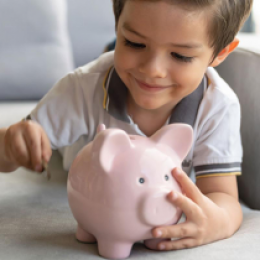
Oh baby, it is time to start saving for the newest member of your family. When it comes to saving for a new baby it is very important to factor in all the expenses for supplies, potentially lost wages and even the optional splurges. The bucks spent on babies can be big, but here are some tips when budgeting for a baby to save where you can.
1. Calculate an Estimated Cost for the First Year
Tip #1 is very important and truly should be done if possible before a baby is even on your radar. Bringing a human into the world is a huge job and expense. It is very important for not only the baby to be comfortable, but the caregivers.
When saving for a baby, a few costs to factor in would be:
- Parent loss of wages
- Nursing supplies
- The nursery
- Diaper supplies
- Clothes
- Babysitting or daycare
- Health & life insurance
- Medical fees
Depending on how you choose to raise your baby and your lifestyle, there could be more and there could be less to factor in. Doing research in advance to pre-plan roughly how much you need to expect to spend in each category can give you a good idea of your overall cost. There is no way to plan perfectly. Unforeseen circumstances will come up, but the best thing you can do is over plan and expect to spend more so that your emergency fund and savings are there for you if something were to come up.
2. Buy Used
Buying used items for the most part is obtainable except for a few things. Consider buying used clothes, baby gear and furniture. Decide which items you would like to splurge on that will be worth it in the long run and what you would like to purchase used that you can save on. Some items you might wait until your baby comes until you choose to buy, solely because they may or may not use it. It is also helpful to consider if it’s just a short-term stage where they may need it, such as a bassinet.
There are great options online such as Facebook Marketplace or New Mom groups that you could get involved with to find the best deal on used products. Sometimes you can buy multiple items together for a great deal when someone is getting rid of all their baby stuff at once. It's never a bad idea to buy the full car seat set so you are covered for a few years.
3. Shop in the Off-Season
If you do need to stock up on outfits, a smart way to save but still be able to purchase new is to shop in the off-season. With clothing, do not go overboard - they grow so quickly. A money-saving tip with clothes is to purchase gender-neutral colors so that you can re-use for your next regardless of gender and because they are easier to pair with multiple options.
4. Do Your Research
Doing your research and sale searching can cut many costs. Asking about products, tips and waiting to see what others did and didn’t use can save you from spending an extra $100 here and there on products. Consider waiting to buy big-ticket items until you are sure they will be utilized, such as a changing table. Instead of purchasing a full changing table, buy a changing pad instead that you could place on a dresser you already have.
Another big item you’ll be purchasing is a car seat. Instead of buying solely a car seat, look into options that you can continue to convert and use for a majority of baby and toddler years. Also, consider the cost of multiple bases so you don’t only have that one base to use in case of an emergency.
5. Stock Up on Products
Stocking up on products you know you’ll be needing is never a bad idea, especially if you’re getting a steal buying in bulk. Being selective about what you buy in bulk is key. Do not over-buy clothing because you can never tell how big your baby will be during that season in 6 months to a year. The same can go for diapers and shoes, especially if they haven’t started walking – maybe wait to buy until they do.
There is no secret how best to save for a baby, but what you can do is research and hold off until you know for certain what you need to make both you and your baby comfortable. There are so many great baby products on the market, and they can get expensive. Your baby will never know if it wore something used or lived their first few months without a pacifier or bassinet. You are in the driver’s seat to control what is and what is not a baby product priority so you can best budget for the bundle of joy coming into this world.










